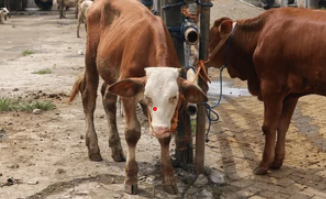Bihar Government Issues Monsoon Advisory for Livestock Owners, Warns Against Tying Animals to Electric Poles

With the monsoon season in full swing, livestock care has become a significant challenge for farmers and animal owners across Bihar. To prevent accidents and safeguard animal health, the state’s Animal and Fisheries Resources Department has issued a detailed advisory, urging livestock owners not to tie their animals to electric poles during the rainy season.

Patna, August 11 –
With the monsoon season in full swing, livestock care has become a significant challenge for farmers and animal owners across Bihar. To prevent accidents and safeguard animal health, the state’s Animal and Fisheries Resources Department has issued a detailed advisory, urging livestock owners not to tie their animals to electric poles during the rainy season.
According to the department, electrical installations pose a serious threat to both animals and humans during monsoons due to the increased risk of electric shocks caused by water exposure. Alongside this warning, officials have provided a list of best practices for livestock care during the rainy months.
Key Safety Guidelines for Monsoon Livestock Care
-
Vaccination Against Infectious Diseases
Owners are advised to vaccinate their animals against various contagious diseases to prevent seasonal outbreaks. -
Avoid Overcrowding in Cattle Sheds
Keeping too many animals in one shelter can increase stress, disease transmission, and injury risks. -
Protect Animals from Rain Exposure
Livestock should not be taken out during heavy rainfall to prevent illness and accidents. -
Prevent Waterlogging
Stagnant water can become a breeding ground for mosquitoes and parasites, leading to vector-borne diseases. -
Repair Cattle Sheds Before Monsoon
Roofs should be fixed to prevent rainwater leakage. Windows should be kept open for ventilation, and fans should be used to counter heat and humidity. -
Ensure Proper Waste Management
Animal sheds must be cleaned daily with disinfectant solutions like phenyl to reduce harmful bacteria. Insecticides should be sprayed at regular intervals. -
Provide Clean Drinking Water and Nearby Fodder
Fresh water should be made available within the shed premises, and feed should be stored nearby to avoid animals having to travel in wet conditions. -
Avoid Taking Animals to Ponds and Reservoirs
Instead, provide clean water from a bucket or other safe sources to reduce the risk of infections. -
Proper Disposal of Dead Animals
Carcasses should be buried far from water bodies, grazing grounds, and village pathways to prevent contamination and disease spread.
Economic and Health Benefits
The department emphasized that by following these guidelines, farmers and livestock owners can protect their animals from seasonal illnesses, prevent accidental deaths, and ultimately ensure better productivity. Healthier livestock not only means reduced veterinary costs but also higher economic returns for farmers.
The advisory serves as a reminder that monsoon care is not just about shelter but also about proactive disease prevention, hygiene, and safety from electrical hazards.
About The Author
Welcome to Aryan Age, an English newspaper that has been serving readers since 2011 from Delhi. With a loyal circulation of over 19,000, we are dedicated to providing our readers with the latest news and information, as well as insightful analysis and commentary that help them navigate the complex and rapidly changing world.







Comment List